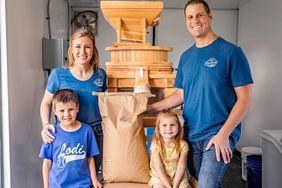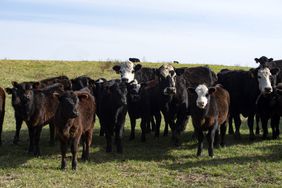:max_bytes(150000):strip_icc()/youngfarmer01-b023fb0d613b481681d53615a906e206.jpg)
When you are struggling to keep net income above zero, every expense is in play. The expense I would like to explore today is veterinary bills. Obviously, there is an incorrect way to save on those — don't call the vet when your animals needs them. And, there is a correct way to do it — preventive care that keeps the animals so healthy that their vet costs are minimized.
When I had some questions on cost-effective animal healthcare, I approached a couple veterinarians and asked them if they would share with you their tips on animal management. Specifically, I asked them if they would share ways to save money on vet bills, and they were gracious enough to do so.
The first conversation I had was with Jeff Clinebell of Columbia Animal Hospital, who treats a lot of horses. "Good preventive medicine is what I recommend — regular vaccines and deworming," says Clinebell. Some diseases are regional, he says, so you can customize the course of vaccines that an animal receives, depending on where it lives. This saves money over giving the animal every last vaccine that exists. According to Clinebell, "If certain horses are going out to shows, trail rides, or boarding at other stables, they can bring something back to the rest of the herd. So, those animals need a broader coverage of vaccines than the ones that stay on the farm."
One surprising mistake Clinebell mentions is that some animal owners deworm them too frequently. As a result, some parasites are becoming resistant — difficult to kill. Another mistake is not cleaning out stalls often enough. He recommends cleaning a stall daily, though some people do it only once or twice a week. More frequent cleaning can head off some parasite infestations. Lastly, Clinebell recommends feeding the animals good-quality hay (without mold) and a concentrated feed to prevent intestinal problems. He also suggests keeping the animal's drinking water clean and fresh.
The second person I talked with was Allen Mueller of Mueller Veterinary Services. Mueller works with a lot of feed animals (cattle and swine), and says his No. 1 recommendation is to be vigilant to animals' needs day to day. He gives an example: "At -10°F., you have to give them shelter, and you can't let their water freeze up for 24 hours." He echoes Clinebell's advice about the importance of clean water, saying, "An animal's water should be so clean that you would drink it." He also recommends getting your vaccination program from your local veterinarian because of how different the required vaccines are in different parts of the country.
Mueller mentions that one mistake he sees animal owners make is buying vaccines and dewormers and administering incorrect dosages or using them on the wrong problems. He says, "People buy a product they think they understand, but they don't." By doing so, they can cause problems that did not exist before. Mueller says that one good way to save money on vet costs is to go ahead and learn basic first aid. According to Allen, "You don't have to have a vet treat every scratch on a cow." The last thing Allen warned against was "dabbling in too many different animals." He explained that some people get a few chickens, goats, sheep, cows, pigs, and horses, and their lack of knowledge on how to care for the various animals results in a lot veterinarian bills — bills that would have been avoided had they become experts on one animal at a time.







